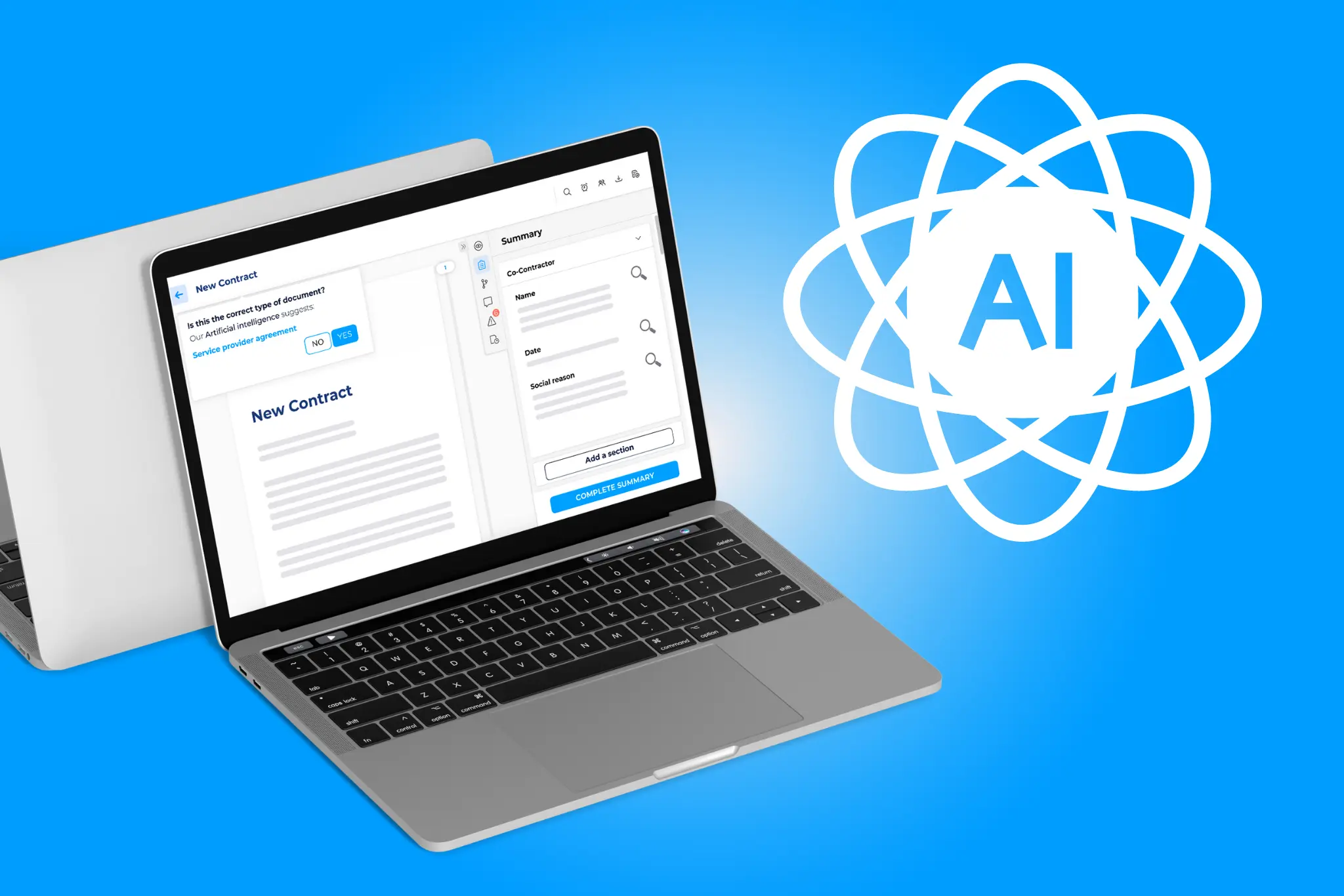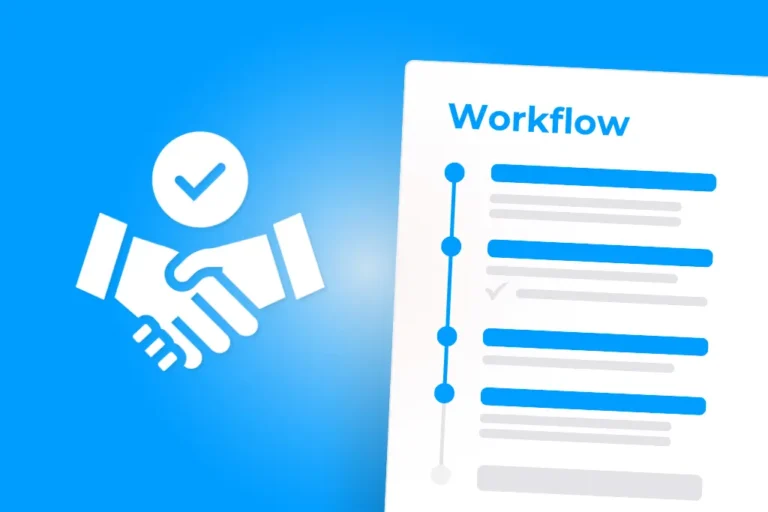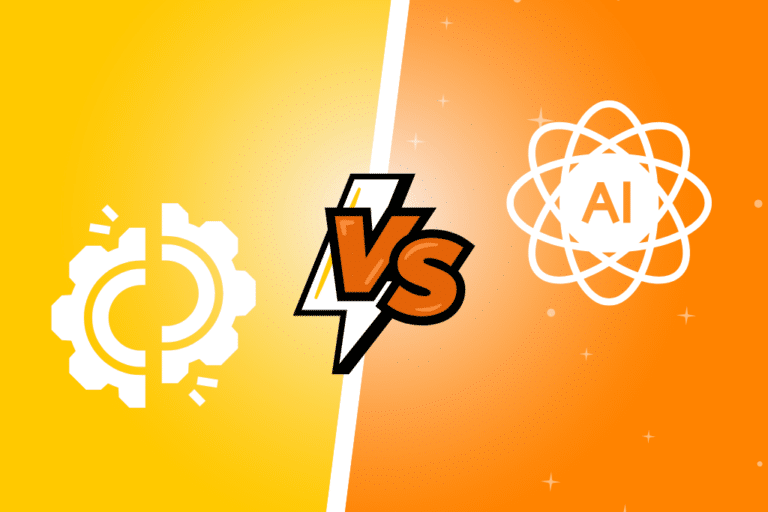In the realm of contract management, the integration of artificial intelligence (AI) has revolutionized the way businesses handle their agreements. Artificial intelligence is the driving force at the heart of the digitalization of the legal profession, particularly within companies’ in-house legal departments.
Lawyers are having their day-to-day operations transformed by this technology. It is relieving them from the burden of often tedious work and freeing up their time for high value-added tasks.
But what role does artificial intelligence play in the context of contract management? How does it work?

What is artificial intelligence?
Definition
In recent years, there has been a great deal of talk around artificial intelligence, though not everyone knows the story behind this expression. One might even be led to believe that AI is a recent concept. However, the term has existed since 1956, when there was a conference at Dartmouth, in the US, where scientists, economists and computer scientists came together to formalize the existence of the discipline as a field of research.
At a time when computer science was still taking its first steps, artificial intelligence was presented as a collection of theories and techniques aimed at creating machines capable of reproducing certain aspects of human intelligence. An ambitious definition indeed!
These days, the main developments of artificial intelligence involve computer programs designed to replace humans in carrying out repetitive tasks of varying degrees of complexity. Its key benefits include time savings and increased productivity, both in the workplace and in our everyday lives. Indeed, artificial intelligence technologies can be applied in just about any field.
AI or machine learning?
When talking about artificial intelligence, the term “machine learning” often crops up. Machine learning is a method that underpins the functioning of many forms of AI technology: it is the use of algorithms that allow a machine to extract patterns from one or more datasets.
The machine then uses these patterns to “learn” – or, more specifically, the algorithm adapts to the new data. This is particularly applicable in the context of contract management, as contracts are collections of data that are constantly evolving, according to their lifecycle and regulatory changes. As such, to remain fit for purpose, contract management tools that use AI must keep on top of the ever-changing data they handle.
The different types of artificial intelligence
There are actually two types of artificial intelligence, each corresponding to different functions and objectives:
- Symbolic AI, in which the program runs according to rules established by a human being. Here, the program does not learn of its own accord; rather, its reasoning is rooted in rules that have been dictated in advance.
- Learning AI — or machine learning — in which the program learns from inputted data, then applies the logic it has constructed when processing new datasets. The program learns of its own accord, as a result of the specific information it encounters.
Learning AI offers a much broader horizon of possibilities, as it is a flexible and autonomous piece of technology.
Using AI to support contract management: how does it work?
Handling contracts and extracting information
In the context of contract management, the main advantage of AI is the ability to read, recognize and analyze text automatically. One commonly-used technology is optical character recognition (OCR), which allows the user to produce a text file from an image that contains text. Automated language analysis also allows the user to process one or more contracts and:
- identify the type of contract;
- recognize and separate the different clauses;
- identify the key elements (names of the parties, amounts, deadlines, etc.).
Without this technology, these tasks are carried out manually by legal experts or the operational staff handling the contracts. This takes up a considerable amount of time, not to mention the risk of error due to skim reading or oversight.
Automating the contract lifecycle
Contracts are far from being fixed documents: they are in constant evolution. They change over time, following a lifecycle that involves multiple stages, from drafting to the monitoring of their execution – not to mention any renewals required subsequently.
Artificial intelligence does not stop at a textual analysis of the document – far from it. It also saves time (while improving accuracy!) at every stage of the contract’s lifecycle.
In this way:
- During the drafting stage, AI makes the task significantly easier by allowing the writer to use templates or import the most relevant clauses;
- During the negotiation stage, artificial intelligence allows the writer to pinpoint key information, making the process simpler, faster, and more secure;
- Upon validation and signing, smart approval workflows ensure that exchanges run more smoothly, while strictly respecting the required order of signatures;
- During the monitoring stage, the tool allows the user to check that all contracts are being properly executed, selecting them by date, clause, or even signatory.
Finally, artificial intelligence also makes it easier to carry out auditing and reporting, which are both essential tools for monitoring contract performance. The tool performs smart data analysis to produce relevant KPIs. This allows the user to identify the risks and opportunities associated with the contracts in question.
Ultimately, contract management tools that use AI do much more than simply reduce the burden of tedious tasks.
This is a crucial aspect, as it allows legal experts and their staff to dedicate more time to their core business. But AI also helps streamline the contract lifecycle, improving satisfaction for all parties involved (clients, providers, etc.). It also opens up useful new options for analysis, facilitating decision-making at all levels.
Want to find out more about the artificial intelligence used in our modules? Contact us!
This could also interest you:


